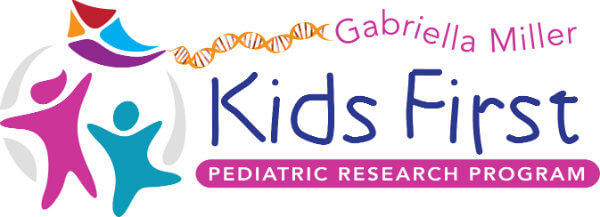Kids First Pediatric Research Program Moves Forward
, by J. Guidry Auvil, Ph.D., and M. Smith, M.D., Ph.D.
Earlier this month, researchers gathered in Rockville, MD, for the first annual meeting of an important NIH-sponsored initiative that will expand research on childhood cancers and certain types of birth defects.
The initiative, the NIH Common Fund’s Gabriella Miller Kids First Pediatric Research Program (Kids First), was created in part to increase knowledge about the genetic changes associated with two serious medical conditions in children—cancers and structural birth defects, such as congenital heart defects, craniofacial anomalies, and skeletal/organ development malformations.
The hope is that by creating opportunities for investigators from different research communities to share resources and collaborate, Kids First may lead to new ways of thinking about pediatric diseases. These insights, in turn, could be the basis for developing clinical studies and new strategies for diagnosing, managing, and treating patients.
Children with certain birth defects have an increased risk of developing some pediatric cancers, suggesting that these conditions may share some common biological pathways. More research is needed, however, to characterize these pathways and to look for shared mechanisms of disease.
A Cloud-Based Resource for Pediatric Research
We serve as NCI members of the Kids First program’s leadership group, along with scientists from other NIH institutes that support research on structural birth defects, pediatrics, and/or genomics. During its first 3 years, the Kids First program has focused on identifying cohorts of children, with specific cancers, structural birth defects, or both, for which gene sequencing can make important scientific contributions.
DNA samples from the children in these cohorts and their parents are being analyzed (with whole-genome sequencing) at one of two Kids First sequencing centers. For some of the cancer-specific projects in Kids First, DNA and RNA from tumors (or leukemia cells) are also being sequenced with whole exome and/or transcriptome platforms.
An important step taken in July was the selection of the Children’s Hospital of Philadelphia (CHOP) to create the Kids First Data Resource Center (DRC). This cloud-based repository of genomic and clinical information from the Kids First cohorts will have the computational infrastructure and tools required for researchers to analyze large-scale data sets.
The CHOP team will lead this multi-institutional effort, which also includes the Ontario Institute for Cancer Research, the University of Chicago, Children’s National Health System, Oregon Health and Science University, and Seven Bridges.
The Kids First meeting held earlier this month brought together for the first time the research teams that developed the cohorts selected for sequencing with the leaders of the Data Resource Center and the sequencing centers. The team at CHOP is working to ensure that the Kids First Data Resource Center is easy to use for the pediatric disease community at all levels, and that it will meet the research needs of various types of investigators, clinicians, and data scientists.
The Data Resource Center is expected to include data from more than 25,000 samples from patients and family members by the end of 2018, which would make it the largest pediatric data cohort of its kind.
Advocating for Pediatric Cancer Research
The Kids First program honors the memory of Gabriella Miller, who, in 2012, at 9 years of age, was diagnosed with a rare and aggressive brain tumor called diffuse intrinsic pontine glioma. Gabriella soon became an advocate for cancer research and petitioned Congress for increased support for pediatric research before her untimely death just one year later.
The Gabriella Miller Kids First Research Act was signed into law on April 3, 2014, authorizing $12.6 million to be appropriated each year for up to 10 years to support pediatric research at NIH.
Kids First is an NIH Common Fund program and is being co-led by four NIH institutes: NCI; the Eunice Kennedy Shriver National Institute of Child Health and Human Development; the National Human Genome Research Institute; and the National Heart, Lung, and Blood Institute. A working group of program officers from nine other NIH institutes and centers is helping to guide the program’s research efforts.
Using “Big Data” to Better Understand Childhood Cancers
Because pediatric cancers and specific structural birth defects are relatively uncommon, the Kids First initiative will aggregate data sets that can be used to potentially identify genetic changes associated with these conditions.
Kids First will complement ongoing pediatric efforts within NCI, including the Therapeutically Applicable Research to Generate Effective Treatments (TARGET) initiative, a multinational collaborative effort to conduct comprehensive genomic analyses of certain pediatric cancers.
TARGET investigators have been identifying the molecular changes that drive these cancers and have made those data available through the TARGET Data Matrix and the NCI Genomic Data Commons. TARGET results have led to the development of clinical trials evaluating new therapies that target these molecular alterations.
By opening new avenues of research, the Kids First program and its Data Resource Center will allow the development of knowledge that may be used to improve the care of young patients—a fitting way to honor the memory of Gabriella Miller and of all children affected by cancer and birth defects.

